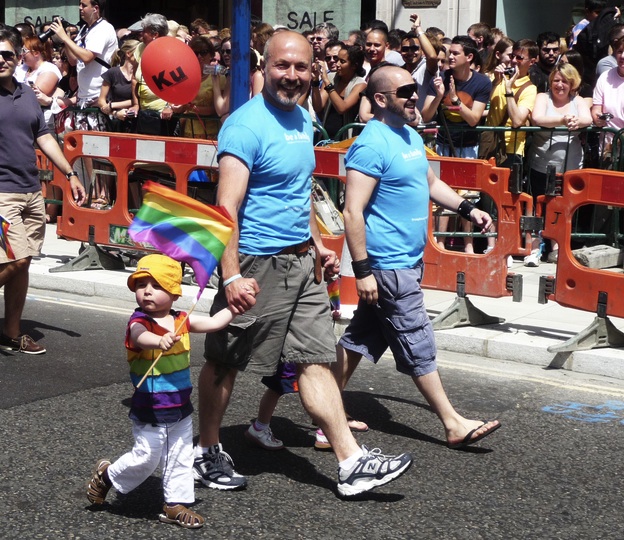Supreme Court Prop. 8 Arguments Focus on Sex, Science

Get the world’s most fascinating discoveries delivered straight to your inbox.
You are now subscribed
Your newsletter sign-up was successful
Want to add more newsletters?

Delivered Daily
Daily Newsletter
Sign up for the latest discoveries, groundbreaking research and fascinating breakthroughs that impact you and the wider world direct to your inbox.

Once a week
Life's Little Mysteries
Feed your curiosity with an exclusive mystery every week, solved with science and delivered direct to your inbox before it's seen anywhere else.

Once a week
How It Works
Sign up to our free science & technology newsletter for your weekly fix of fascinating articles, quick quizzes, amazing images, and more

Delivered daily
Space.com Newsletter
Breaking space news, the latest updates on rocket launches, skywatching events and more!

Once a month
Watch This Space
Sign up to our monthly entertainment newsletter to keep up with all our coverage of the latest sci-fi and space movies, tv shows, games and books.

Once a week
Night Sky This Week
Discover this week's must-see night sky events, moon phases, and stunning astrophotos. Sign up for our skywatching newsletter and explore the universe with us!
Join the club
Get full access to premium articles, exclusive features and a growing list of member rewards.
The U.S. Supreme Court heard 60 minutes of oral arguments in Hollyingsworth v. Perry, a case involving California's Proposition 8, on Tuesday (March 26), touching on issues of legal standing, sex and science.
Proposition 8 was a 2008 ballot initiative that reversed an earlier California Supreme Court decision allowing gays and lesbians to wed in the state. A federal district court and the Ninth Circuit Court of Appeals both overturned Proposition 8 as unconstitutional, on the basis that it took away a right once held by the state's gay and lesbian minority. However, same-sex marriage has been on hold in California as the case has made its way to the Supreme Court.
The justices first grilled the lawyer representing Proposition 8, Charles Cooper, on whether his clients have legal standing to pursue the case. The state of California itself is not defending Proposition 8, and the job has been taken over by a group called ProtectMarriage.com, led by Dennis Hollingsworth.
The anti-Proposition 8 case, represented by lawyer Theodore Olson, is brought by Kristin Perry, a lesbian denied a marriage license in California in 2009.
Scientific arguments
After hearing arguments on the legal standing issue, justices quizzed Cooper on whether same-sex marriage could cause any harm, with the lawyer arguing that same-sex marriages are too new to know for sure.
"I think it better for California to hit the pause button and await additional information from the jurisdictions where this experiment is still maturing," Cooper said, speaking for a hypothetical California voter.
Get the world’s most fascinating discoveries delivered straight to your inbox.
Justice Antonin Scalia then stepped in to offer a concrete possibility for harm.
"I don't know why you don't mention some concrete things," he said, according to a court transcript. "If you redefine marriage to include same-sex couples, you must — you must permit adoption by same-sex couples, andthere's - there's considerable disagreement among -- among sociologists as to what the consequences of raising a child in a — in a single-sex family, whether that is harmful to the child or not." [5 Scientific Reasons Gay Parents Are Awesome]
Sociologists and psychologists have only recently begun investigating the effects of same-sex parenting on children. Early results are based on small studies, but these studies have failed to find any major red flags. In one 2010 study that combined data from 80 different research projects, for example, children of lesbian parents had similar levels of academic achievement and well-being compared with kids of straight parents. California currently allows gay couples to adopt.
Much of the debate circled around the needs of children and the importance of procreation to the state's interest in marriage. In one exchange, Justice Elena Kagan asked whether it would be constitutional to prevent couples over the age of 55 from marrying, given that they would not be procreating.
"Your Honor, even with respect to couples over the age of 55, it is very rare that both couples, both parties to the couple are infertile, and the traditional -" Cooper began, before being interrupted by laughter.
"I can just assure you, if both the woman and the man are over the age of 55, there are not a lot of children coming out of that marriage," Kagan shot back. [See full transcript of the Prop. 8 arguments]
For and against
The arguments pitted two different worldviews against one another. Cooper summed up the pro-Proposition 8 side, saying "The concern is that redefining marriage as a genderless institution will sever its abiding connection to its historic traditional procreative purpose, and it will refocus, refocus the purpose of marriage and the definition of marriage away from the raising of children and to the emotional needs and desires of adults."
Meanwhile, Olson argued that Proposition 8 "walls off gays and lesbians from marriage, the most important relation in life, according to this Court, thus stigmatizing a class of Californians based upon their status and labeling their most cherished relationships as second-rate, different, unequal and not okay."
The justices have a wide range of options in the Proposition 8 case, from ruling that the proposition's supporters have no standing to ruling on whether marriage is or is not a fundamental right guaranteed in the U.S. Constitution. In the former case, same-sex marriages in California would likely resume, but the ruling would not affect other states. The latter decision would have national ramifications.
The Court could also decide that Proposition 8 is unconstitutional on the technicality that California allows same-sex unions for gay couples and marriage for straight couples. This, the Court could decide, sets up an unconstitutional situation of "separate but equal" that violates the 14th Amendment. Such a ruling would affect only California and other states that allow civil unions but prohibit gay marriage.
Follow Stephanie Pappas on Twitter and Google+. Follow us @livescience, Facebook & Google+. Original article on Live Science.

Stephanie Pappas is a contributing writer for Live Science, covering topics ranging from geoscience to archaeology to the human brain and behavior. She was previously a senior writer for Live Science but is now a freelancer based in Denver, Colorado, and regularly contributes to Scientific American and The Monitor, the monthly magazine of the American Psychological Association. Stephanie received a bachelor's degree in psychology from the University of South Carolina and a graduate certificate in science communication from the University of California, Santa Cruz.
 Live Science Plus
Live Science Plus





